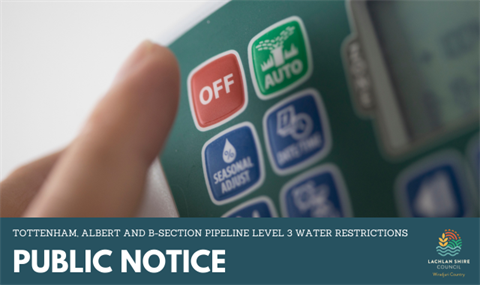TOTTENHAM, ALBERT & B-SECTION PIPELINE LEVEL 3 WATER RESTRICTIONS
Published on 06 February 2025

Tottenham, Albert and the B-Section Pipeline
Level 3 water restrictions are effective immediately for water consumers along the B-Section Pipeline, Albert and Tottenham. This is due to limited supply from the B-Section Pipeline and Leg O’ Mutton Dam.
Level 3 Water Restrictions
During summer, residential and non-residential users can:
- Water lawns and gardens every second day as per the odds and evens system between 6am to 9am and 6pm to 9pm. Only microsprays, drip systems and soaker hoses are permitted.
- Irrigate new turf for up to one week after laying, after which the above point applies.
- Washing cars at home with bucket and rinsing with trigger hose on lawn between 9am to 12pm any day.
- Topping up and filling garden water features.
- Topping up of swimming pools and spas between 7am to 9am and 6pm to 8pm daily, provided pool covers are used.
- First fill of swimming pools and spas are only with Council permission and provided pool covers are used.
- Most commercial activities are permitted with a Water Savings Action Plan in place. Please refer to the water restrictions table, available on Council’s website, for activity particulars.
- General household usage, however full loads for washing clothes is encouraged.
The following activities are not permitted:
- Use of watering systems, non-fixed sprinklers and hand-held hoses.
- Washing down walls and paved surfaces.
For further details on activities that are permitted or prohibited at different restriction levels, download the water restrictions tables on Council’s website:
https://www.lachlan.nsw.gov.au/Everyday-Living/Residents/Water-Restriction-Information
Why conserve water?
Water is a precious resource that we need to use wisely.
- It’s better for the environment - by using water efficiently rivers keep flowing, dams stay full, and groundwater supplies stay healthy for wildlife and plants.
- It’s better for the Planet - capturing, treating and pumping less water to our homes uses less energy.
- It’s better for the bank balance - reducing your water bills and by using less hot water, reduces your energy bills as well.
For more information and tips on how you can use water more efficiently, visit Smart Water Advice - https://smartwateradvice.org/